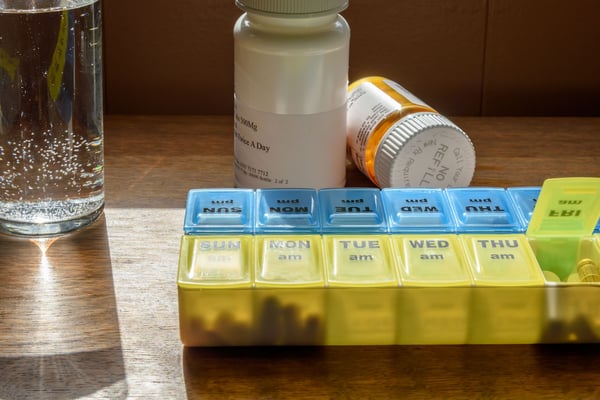Retail and Clinical Pharmacists: Creating Better Patient Outcomes
If when you hear the word “pharmacist,” you immediately envision someone wearing a white coat standing behind a counter in either your neighborhood pharmacy or grocery store, you’re not alone. While retail pharmacists like the ones we mostly associate with are an integral component of our healthcare system and represent a large portion of pharmacist career pathways, there are other opportunities for pharmacists to use their clinical training and knowledge in ways that impact patients’ lives more directly. However, for the best health outcomes, clinical and retail pharmacists must both play their roles on the patient care team. Let’s learn about how they can collaborate to create better health outcomes for their patients.

The role of the retail pharmacist in patient care
Pharmacists often embark upon a retail career path in which they manage all aspects of a pharmacy, including:
- Answering phones
- Dispensing medications
- Creating schedules for pharmacy staff
- Stocking shelves with inventory
- Managing inventory
- Administering vaccinations
- Counseling on medications
- And much more
Among the long list of retail pharmacist responsibilities, the most important is counseling patients on medications. This is because under the watchful eye of a pharmacist, patients are able to get the maximum benefit from their medications, have their questions answered, and be aware of potential side effects. However, the difficulties of a retail environment, including all the other duties that pharmacists are responsible for, can often get in the way of patient consultations. In theory, a pharmacist would counsel each patient as they come in to fill their prescriptions. However, in the real world, that is not so. Often times retail pharmacists are overworked, strapped for time, and facing staff shortages causing them to pick up extra duties.
In the context of these hectic work environments, retail pharmacists are often unable to devote the necessary amount of time to patient consultations. While no fault of pharmacists, this dynamic causes patients’ questions to go unanswered and potentially harmful side effects to go unnoticed.
The role of the clinical pharmacist in patient care
In light of the encumbrances on retail pharmacists, new career paths for pharmacists to take on more clinical roles have emerged in recent years. These career options allow pharmacists to make use of their extensive education, training, and medication knowledge while directly providing care to patients. In some instances, this can look like a collaborative practice agreement, wherein a pharmacist is on staff with a provider group, and able to counsel patients on their medications. In other cases, it can mean that pharmacists take control over their own careers with a digital platform such as Aspen RxHealth. Aspen RxHealth pharmacists have a never-before-seen level of career freedom that gives them the ability to make their own hours, work as much or as little as they like, and build their own panel of patients over time.
Aspen RxHealth’s clinical pharmacists work remotely, meaning they can deliver patient care from anywhere in the US with an internet connection by using Aspen RxHealth’s mobile iOS app.
During patient consultations, Aspen RxHealth pharmacists address issues such as medication adherence, patient education, specialty medication management, medication therapy management, and other critical clinical pharmacy services. This creates a proactive care model by regularly reviewing patients’ medication regimens to detect errors before they cause problems.
How remote and clinical pharmacists can work together
With new care delivery channels available that bring clinical pharmacy services within reach of more patients are still emerging technologies, it’s easy to look a few years into the future at how the pharmacy field could change.
Perhaps this new dynamic could take some burden off the shoulders of retail pharmacists by removing the need for them to counsel on medications, as these consultations could be delivered remotely by clinical pharmacists.
Additionally, models such as Aspen RxHealth provide more direct benefits to retail pharmacists. Because of the freedom to work whenever they wish, retail pharmacists can dip their toes into the world of remote care delivery while earning extra income by joining the Aspen RxHealth Pharmacist Community. In fact, over 7,000 pharmacists across the US have already made the switch and are reaping the benefits of this innovative new care delivery platform.

The impact of clinical and retail pharmacist teams on patient education
With the advent of new ways for clinical pharmacists to use their skills, patient education is drastically improved. Now, patients have multiple modalities of getting their medication questions answered by an experienced pharmacist:
- The traditional route: Patients can still speak with pharmacists in a retail setting when picking up prescriptions to learn about their medications and how to get the maximum benefit and avoid side effects.
- Remote care delivery: A remote clinical pharmacist using the Aspen RxHealth platform can proactively reach out to a patient taking a new medication, educate them on proper use, screen for other health issues or barriers, and ultimately improve medication adherence and outcomes.
The impact of clinical and retail pharmacist teams on patient outcomes
It’s no surprise that by improving patient education, we can subsequently improve patient health outcomes. This is because by equipping patients with the tools and knowledge they need to improve their health, they are able to take an active role in improving their condition management and medication use.
The new dynamic of retail pharmacists and remote clinical pharmacists is one that creates the benefits of:
- Improved patient education
- Medication adherence
- Specialty medication management
- Condition management
- Stronger pharmacist-patient relationships
- Healthier lives for patients and more fulfilling careers for pharmacists
If you’re a pharmacist looking for a new way to use your skills and education, give Aspen RxHealth a try. Learn more and see why 7,000 clinical pharmacists have already joined.